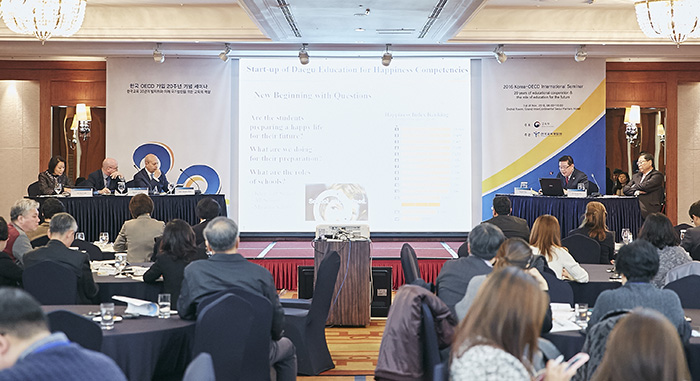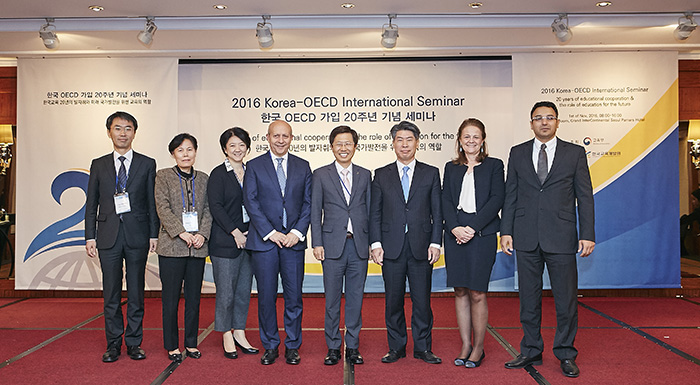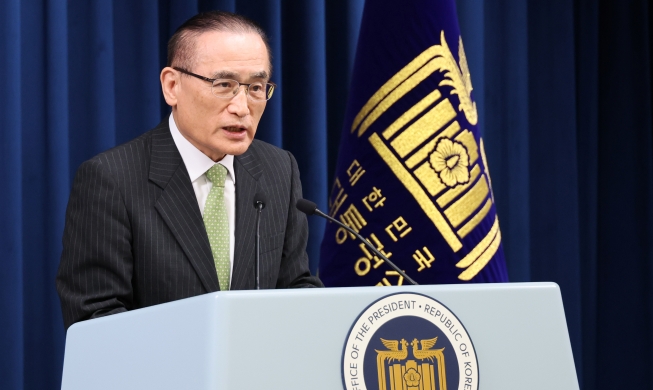In celebration of the 20th anniversary of Korea's membership of the Organisation of Economic Co-operation and Development (OECD), education experts convened in Seoul to discuss the present and future of Korea's educational policies.
On Nov. 1, the Ministry of Education hosted the 2016 Korea-OECD International Seminar, under the theme of "Twenty years of educational cooperation and the role of education for the future."
Part one of the seminar touched on progress made in Korean education, focusing on cooperation between Korea and the OECD. Part two set the stage for a panel discussion, where experts shared their ideas on the direction that education policy should take in the future.
Among those in attendance at the seminar were OECD Deputy Director of Education and Skills Montserrat Gomendio, Director Kang Young Hae of the Korean Education Development Institute (KEDI), President Daniel Zajfman of the Weizmann Institute, and the head of the cultural mission at the Embassy of Saudi Arabia in Korea, Hesham Khadawardi.

On the occasion of the anniversary, the OECD published its "Education Policy Outlook for Korea," a report outlining the country's educational policies.
According to the report, "Korea is one of the OECD's top performers in mathematics, reading and science in the 2012 Program for International Student Assessment (PISA)," and, "Korea has some of the highest attainment rates among OECD countries in upper secondary and tertiary education for 25-34 year-olds."
In terms of key policy issues, the report specified the need to "further improve equity in education attainment by developing policies targeted at low-income and multicultural households." Pointing to the high demand for supplementary private education at private tutoring institutions, the report asked that Korea "advance its recent efforts to provide an educational environment where students have less stress and can develop their full potential... according to individual needs and motivations." The report also requested that Korea continue to provide "a well-aligned evaluation system" and to make the best use of resources "to improve quality and reduce dependence on household expenditure."
For the selected policy responses, the report highlighted three educational policies implemented by the government in recent years. These included the Nuri curriculum, an after-school childcare service available to all 3-5 year olds, the Free Semester System for middle school students, allowing them "to focus on developing their talents and explore various interests and career options," and, finally, the National Competency Standards (NCS), which helped to standardize the competencies needed to successfully perform a job.

During the panel discussion, different experts shared their ideas on educational policy.
Hesham Khadawardi, head of the cultural mission at the Embassy of Saudi Arabia in Korea, emphasized the need to understand a country's state of affairs before making decisions on policy. "Pushing Korea to follow an international standard without considering its unique features could dampen the country's competitive drive, the same force that drives its economic growth. Policy makers need to focus on creating a unique ecosystem for education."
"People tend to realize their full potential in a freer environment, less so under strict regulation," said Daniel Zajfman, president of the Weizmann Institute. "Only when the education system nurtures a variety of skill sets can we see rise of creative talent. The Israeli education system values open discussion, and sees debate as a means to exchange ideas and to come up with new ones. The role of education is to teach us the best way to mediate conflict."
By Lee Hana
Korea.net Staff Writer
Photos: Ministry of Education
hlee10@korea.kr
On Nov. 1, the Ministry of Education hosted the 2016 Korea-OECD International Seminar, under the theme of "Twenty years of educational cooperation and the role of education for the future."
Part one of the seminar touched on progress made in Korean education, focusing on cooperation between Korea and the OECD. Part two set the stage for a panel discussion, where experts shared their ideas on the direction that education policy should take in the future.
Among those in attendance at the seminar were OECD Deputy Director of Education and Skills Montserrat Gomendio, Director Kang Young Hae of the Korean Education Development Institute (KEDI), President Daniel Zajfman of the Weizmann Institute, and the head of the cultural mission at the Embassy of Saudi Arabia in Korea, Hesham Khadawardi.

The 2016 Korea-OECD International Seminar is held in celebration of the 20th anniversary of Korea joining the OECD, in Seoul on Nov. 1.
On the occasion of the anniversary, the OECD published its "Education Policy Outlook for Korea," a report outlining the country's educational policies.
According to the report, "Korea is one of the OECD's top performers in mathematics, reading and science in the 2012 Program for International Student Assessment (PISA)," and, "Korea has some of the highest attainment rates among OECD countries in upper secondary and tertiary education for 25-34 year-olds."
In terms of key policy issues, the report specified the need to "further improve equity in education attainment by developing policies targeted at low-income and multicultural households." Pointing to the high demand for supplementary private education at private tutoring institutions, the report asked that Korea "advance its recent efforts to provide an educational environment where students have less stress and can develop their full potential... according to individual needs and motivations." The report also requested that Korea continue to provide "a well-aligned evaluation system" and to make the best use of resources "to improve quality and reduce dependence on household expenditure."
For the selected policy responses, the report highlighted three educational policies implemented by the government in recent years. These included the Nuri curriculum, an after-school childcare service available to all 3-5 year olds, the Free Semester System for middle school students, allowing them "to focus on developing their talents and explore various interests and career options," and, finally, the National Competency Standards (NCS), which helped to standardize the competencies needed to successfully perform a job.

A panel of education experts poses for a group photo during the 2016 Korea-OECD International Seminar, in Seoul on Nov. 1.
During the panel discussion, different experts shared their ideas on educational policy.
Hesham Khadawardi, head of the cultural mission at the Embassy of Saudi Arabia in Korea, emphasized the need to understand a country's state of affairs before making decisions on policy. "Pushing Korea to follow an international standard without considering its unique features could dampen the country's competitive drive, the same force that drives its economic growth. Policy makers need to focus on creating a unique ecosystem for education."
"People tend to realize their full potential in a freer environment, less so under strict regulation," said Daniel Zajfman, president of the Weizmann Institute. "Only when the education system nurtures a variety of skill sets can we see rise of creative talent. The Israeli education system values open discussion, and sees debate as a means to exchange ideas and to come up with new ones. The role of education is to teach us the best way to mediate conflict."
By Lee Hana
Korea.net Staff Writer
Photos: Ministry of Education
hlee10@korea.kr
Most popular
- Military discharge sets stage for reunion of all 7 BTS members
- BTS to mark 12th anniversary of debut with 2-week festival
- Lee Jae-myung officially sworn in as nation's 21st president
- Presidents Lee, Trump discuss tariff deal in first phone talks
- President's 1st executive order is launch of economic task force
